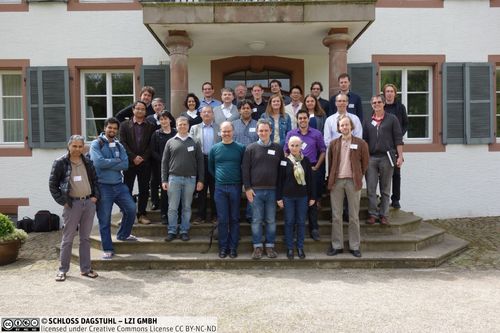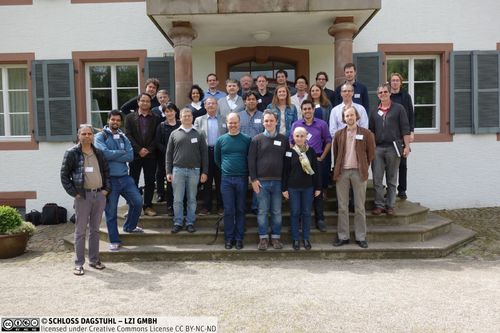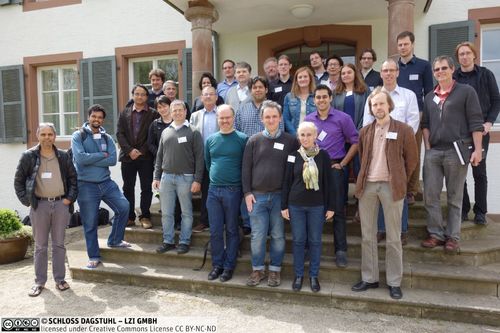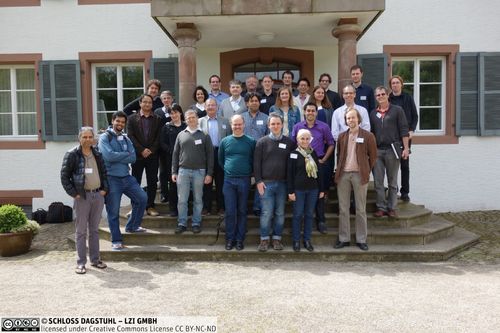Dagstuhl Seminar 16202
Hardware Security
( May 16 – May 20, 2016 )
Permalink
Organizers
- Osnat Keren (Bar-Ilan University, IL)
- Ilia Polian (Universität Passau, DE)
- Mark M. Tehranipoor (University of Florida - Gainesville, US)
- Pim Tuyls (Intrinsic-ID - Mol, BE)
Contact
- Andreas Dolzmann (for scientific matters)
- Annette Beyer (for administrative matters)
Impacts
- Securing the hardware of cyber-physical systems : article in Design Automation Conference (ASP-DAC), 2017 22nd Asia and South Pacific - Regazzoni, Francesco; Polian, Ilia - Los Alamitos : IEEE, 2017. - pp. 194-199.
- Security aspects of analog and mixed-signal circuits : article in Mixed-Signal Testing Workshop (IMSTW), 2016 IEEE 21st International - Polian, Ilia - Los Alamitos : IEEE, 2016. - 6 pp..
- Sensitized Path PUF : A Lightweight Embedded Physical Unclonable Function : article in 2017 Design, Automation & Test in Europe Conference & Exhibition (DATE) - Sauer, Matthias; Raiola, Pascal; Feiten, Linus; Becker, Bernd; Rührmair, Ulrich; Polian, Ilia - Los Alamitos : IEEE, 2017. - pp. 680-685.
- Small Scale AES Toolbox : Algebraic and Propositional Formulas, Circuit-Implementations and Fault Equation - Gay, Mael; Burchard, Jan; Horacek, Helmut; Messeng Ekossono, Ange-Salome; Schubert, Tobias; Polian, Ilia; Kreuzer, Martin; Becker, Bernd - Barcelona : University, 2016. - 6 pp..
- Towards mixed structural-functional models for algebraic fault attacks on ciphers : article in Verification and Security Workshop (IVSW), 2017 IEEE 2nd International - Burchard, Jan; Messeng Ekossono, Ange-Salome; Horacek, Jan; Gay, Mael; Becker, Bernd; Polian, Ilia; Kreuzer, Martin; Schubert, Tobias - Los Alamitos : IEEE, 2017. - 6 pp..
- Trojans in Early Design Steps : An Emerging Threat - Polian, Ilia; Becker, Georg T.; Regazzoni, Francesco - Barcelona : University, 2016. - 6 pp..
The convergence of IT systems, data networks (including but not limited to the Internet) and ubiquitous embedded devices within the cyber-physical system paradigm has led to the emergence of new security threats associated with the system hardware. Manipulating the hardware components that implement security functions can compromise system integrity, provide unauthorized access to protected data, and endanger intellectual property. Additionally, secure hardware is required to protect software in a proper manner tampering. Addressing these vulnerabilities is essential in order to prevent the hardware from becoming the Achilles heel of today’s systems. Current technology trends point towards massive utilization of hardware circuits in larger cyberphysical systems that are interacting with the physical environment via sensors and actuators. At the same time cyber physical systems are more and more integrated via open networks, most notably the Internet. Moreover, they interact with each other, forming systems of systems that exhibit highly complex, emergent behavior and constantly change their boundaries, with new sub-systems continuously entering and leaving. As a consequence, hardware-related threats must be addressed by appropriate countermeasures at realistic costs.
The seminar will focus on security threats where hardware components play the main role, and on countermeasures to address these threats. The emphasis is on generic algorithmic advances on the boundary between computer science and other disciplines. While Hardware Security is a very diverse scientific field, the seminar will specifically focus on its three main areas: passive and active side-channel analysis of security-relevant hardware components (cryptographic blocks, true random number generators) which goes beyond classical cryptanalysis; physical unclonable functions (PUFs) and authentication solutions on their basis; and new threats through hardware Trojans and counterfeit ICs as well as techniques for their detection and neutralization.
The following questions will serve as a starting point:
- How to model side-channel attacks such as to balance between accuracy and simplicity?
- Are there automatic methods to derive a fault-based attack for a given secure circuit?
- How much reverse engineering is required for practical attacks, and can it be prevented?
- Can code-based error detection provide a generic mechanism against attacks and Trojans?
- How to balance between security, quality, yield and reliability of an integrated circuit?
- How dependent are physical unclonable functions on specific sources of variability?
- What are the best PUF-based protocols, and what emerging applications do they enable?
- Can hardware Trojans be detected by low-cost approaches with sufficient confidence?
- How do counterfeit ICs compromise system security, reliability, and availability?
The seminar will bring together researchers working on different aspects of hardware security and contributing competence in neighboring disciplines: cryptography and cryptanalysis; electrical engineering and circuit design; formal methods and solver technology; test methods, reliability and failure analysis; and information and coding theory. Scientists from academia and industry throughout the world are invited to the seminar.
The convergence of IT systems, data networks (including but not limited to the Internet) and ubiquitous embedded devices within the cyberphysical system paradigm has led to the emergence of new security threats associated with the system hardware. Manipulating the hardware components that implement security functions can compromise system integrity, provide unauthorized access to protected data, and endanger intellectual property. Additionally, secure hardware is required to protect software in a proper manner tampering. Addressing these vulnerabilities is essential in order to prevent the hardware from becoming the Achilles heel of today's systems. Current technology trends point towards massive utilization of hardware circuits in larger cyberphysical systems that are interacting with the physical environment via sensors and actuators. At the same time cyberphysical systems are more and more integrated via open networks, most notably the Internet. Moreover, they interact with each other, forming systems of systems that exhibit highly complex, emergent behavior and constantly change their boundaries, with new sub-systems continuously entering and leaving. As a consequence, hardware-related threats must be addressed by appropriate countermeasures at realistic costs.
The seminar will focus on security threats where hardware components play the main role, and on countermeasures to address these threats. The emphasis is on generic algorithmic advances on the boundary between computer science and other disciplines. While Hardware Security is a very diverse scientific field, the seminar will specifically focus on its three main areas: passive and active side-channel analysis of security-relevant hardware components (cryptographic blocks, true random number generators) which goes beyond classical cryptanalysis; physical unclonable functions (PUFs) and authentication solutions on their basis; and new threats through hardware Trojans and counterfeit ICs as well as techniques for their detection and neutralization.
 Osnat Keren and Ilia Polian and Mark M. Tehranipoor
Osnat Keren and Ilia Polian and Mark M. Tehranipoor
- Lejla Batina (Radboud University Nijmegen, NL) [dblp]
- Georg T. Becker (Ruhr-Universität Bochum, DE) [dblp]
- Christian Boit (TU Berlin, DE) [dblp]
- Jan Burchard (Universität Freiburg, DE) [dblp]
- Wayne P. Burleson (University of Massachusetts - Amherst, US) [dblp]
- Jean-Luc Danger (ENST - Paris, FR) [dblp]
- Linus Feiten (Universität Freiburg, DE) [dblp]
- Domenic Forte (University of Florida - Gainesville, US) [dblp]
- Fatemeh Ganji (TU Berlin, DE) [dblp]
- Swaroop Ghosh (University of South Florida, US) [dblp]
- Jorge Guajardo Merchan (Robert Bosch LLC - Pittsburgh, US) [dblp]
- Tim Erhan Güneysu (Universität Bremen, DE) [dblp]
- Sorin A. Huss (TU Darmstadt, DE) [dblp]
- Michael Hutter (Cryptography Research Inc. - San Francisco, US) [dblp]
- Ramesh Karri (New York University, US) [dblp]
- Osnat Keren (Bar-Ilan University, IL) [dblp]
- Tanja Lange (TU Eindhoven, NL) [dblp]
- Roel Maes (Intrinsic-ID - Eindhoven, NL) [dblp]
- Nele Mentens (KU Leuven, BE) [dblp]
- Debdeep Mukhopadhyay (Indian Institute of Technology - Kharagpur, IN) [dblp]
- Ruben Niederhagen (TU Eindhoven, NL) [dblp]
- Sikhar Patranabis (Indian Institute of Technology - Kharagpur, IN) [dblp]
- Elad Peer (CISCO Systems - Haifa, IL)
- Ilia Polian (Universität Passau, DE) [dblp]
- Wenjing Rao (University of Illinois - Chicago, US) [dblp]
- Francesco Regazzoni (University of Lugano, CH) [dblp]
- Ulrich Rührmair (Ruhr-Universität Bochum, DE) [dblp]
- Kazuo Sakiyama (The University of Electro-Communications - Tokyo, JP) [dblp]
- Werner Schindler (BSI - Bonn, DE) [dblp]
- Georg Sigl (TU München, DE) [dblp]
- Shahin Tajik (TU Berlin, DE) [dblp]
- Mark M. Tehranipoor (University of Florida - Gainesville, US) [dblp]
Classification
- hardware
- security / cryptology
Keywords
- Hardware Security
- Cryptographic Primitives
- Side-channel Cryptanalysis
- Hardware Trojans
- Physically Unclonable Functions





 Creative Commons BY 3.0 Unported license
Creative Commons BY 3.0 Unported license
